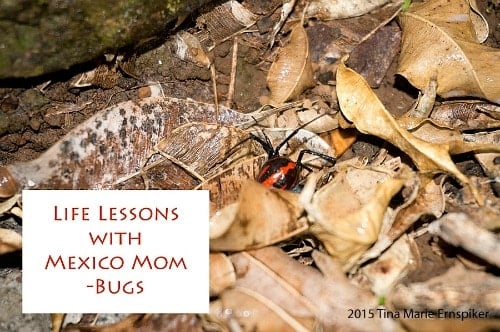
by Tina Marie Ernspiker | Mar 27, 2015 | 2015, Expat Life, Home, Kids, Life Lesson, Living Abroad, Mexico, Moving, Parenting, World Motherhood, Younger Children

As a wife of one and a mom of four, it seems like I am always learning and discovering! I know I am not alone. Let’s just admit it: The world is a big place, life is a lesson, and children can be the best teachers. Normally my series, Life Lessons with Mexico Mom, is hosted on Los Gringos Locos, but today I am posting here on World Moms Blog.
This week’s life lessons are all about bugs. Spiders, cockroaches, bees, and scorpions…oh my! Yikes! Our new home in Uruapan, Michoacan, Mexico was vacant for three years before we moved in last month. The bugs were having a field day, then we arrived. They officially declared our move an invasion and initiated a full scale assault. Our comeback was fumigating with a strong pesticide. Here are my insights and experiences as a Mexico Mom, living with bugs:
Life Lesson 59: I hate Mexican cockroaches just as much as U.S. cockroaches. I don’t know exactly what it is about cockroaches but I hate these creepy, crawly critters. They give me the chills. Maybe it’s because they are associated with rotten food. At least in my mind, I associate them with rotten food. They skittle about and come in all sizes. We have some big ones in Mexico!
Life Lesson 60: Bees go to light just like moths. We have bees on our roof beneath the clay tiles. Someone obviously tried to smoke the hive and get rid of them but it didn’t work. At night the bees go to light. The street light over our balcony, our bedroom light, and our bathroom light. Mr. Curious, aka Tristan, stepped on one and got stung. He is not allergic so no serious damage was done 🙁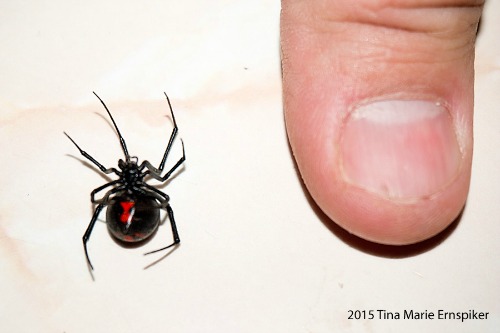
Life Lesson 61: Scorpions are part of the Arachnid class just like spiders. They both have eight appendages. We have seen three scorpions in our house. They were taking a leisurely stroll, till they met the bottom of a shoe. One was smaller then my pinkie nail. We also have our share of spiders. The best one being the giant Black Widow you see in the photos. We watched her die. Her struggle was sad but I can’t imagine what she could have done to one of the kids. I dislike spiders almost as much as cockroaches!
What life lessons did you learn this past week? Please share it with us below. We want to hear your thoughts from around the world!
This is an original post to World Moms Blog by Tina Marie Ernspiker. Tina can be found blogging over at Los Gringos Locos. She is also on Facebook and Twitter.
Photo credits to the author.

by Shaula Bellour (Indonesia) | Mar 12, 2015 | 2015, Awareness, Being Thankful, Exercise, Expat Life, Family, Health, Hobby, Identity, Indonesia, Inspirational, Life, Life Balance, Life Lesson, Living Abroad, Maternal Health, Me-Time, Motherhood, New Year's Resolutions, Parenting, Responsibility, Running, School, Shaula Bellour, Womanhood, World Motherhood
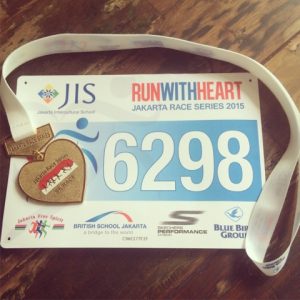 Last Sunday I ran my first 5K race. I still can’t believe that I actually did it – and in the tropical heat, no less. Although I have vaguely considered it a worthy goal, running an actual race wasn’t on my radar even two months ago.
Last Sunday I ran my first 5K race. I still can’t believe that I actually did it – and in the tropical heat, no less. Although I have vaguely considered it a worthy goal, running an actual race wasn’t on my radar even two months ago.
It turns out that 2015 is the year of living dangerously…out of my comfort zone.
My kids often talk about being “risk-takers”. It is one of the ten traits included in the school Learner Profile and students are encouraged to be inquirers, knowledgeable, thinkers, communicators, principled, open-minded, caring, risk-takers, balanced, and reflective. While these traits are all deemed equally important, being a risk-taker is a concept that seems to be especially resonant outside of school too: “I am a risk-taker: I am willing to make mistakes. I am confident and have the courage to try new things.”
For my generally confident (and fruit-averse) daughter, this might mean: “Look Mommy, I’m a risk-taker, I’m eating a mango!” My son takes a more reflective approach – acknowledging when he feels nervous about doing something and emboldening himself with his risk-taker status to eventually take the plunge. Though risk-taking will probably have a different connotation when they are older, I embrace what it means for them now – trying new things and not being afraid to make mistakes.
It’s an important lesson for grown ups, too.
In January, after three years of living in Jakarta, I was starting to feel like my daily life was becoming somewhat routine. Gym, work, grocery store, repeat. To change things up, I found myself saying YES to things that I might not usually consider.
When a friend asked if I wanted to join their early morning running group, I said YES. I knew that the group would likely be too advanced for me but figured that I wouldn’t know if I didn’t try. “What’s the worst that could happen?” I asked myself. I would walk, that’s it. I did walk some at first, but I set my own goals and improved each week. Now we’re training for a 10K.
When another friend asked if I would like to be part of their dance group for an upcoming fashion show event, I said yes to that too. Other friends and even my husband were surprised. Performing a dance routine in front of a huge crowd is WAY beyond my comfort zone, but again I thought: “Why not?” In this case I try not to think about the worst that could happen (falling off the stage comes to mind) but I’m proud of myself for doing it and am actually looking forward to the big night.
I’ve continued with the YES theme in other areas of my life and have already seen positive changes: improved health, new friendships, new possibilities. I’ve realized that pushing my boundaries in this way is also about adjusting my own perceptions of myself. “Oh, but I’m not a runner,” I would repeatedly explain, trying to somehow qualify my actions.
Well now I am a runner. And a dancer. Among many other things.
Life begins at the end of your comfort zone.
Our kids may not recognize some of the bigger risk-taking decisions we’ve made (like moving our lives halfway around the world), but it’s often the smaller actions that resonate the most.
It feels good for them to see that I can be a risk-taker too – I can be afraid sometimes and I can also be brave, just like they are.
When I walked in the door after the race, finisher’s medal around my neck, both kids jumped up from the couch with wide eyes. “Mommy!” my daughter exclaimed, “I didn’t know you would win the race!”
Not exactly…but YES! In my own way, I did.
What risks are you putting out there for yourself this year? How are you embracing these challenges?
This is an original post for World Moms Blog by our mom of twins in Jakarta, Indonesia, Shaula Bellour.
The image used in this post is attributed to the author.
Shaula Bellour grew up in Redmond, Washington. She now lives in Jakarta, Indonesia with her British husband and 9-year old boy/girl twins. She has degrees in International Relations and Gender and Development and works as a consultant for the UN and non-governmental organizations.
Shaula has lived and worked in the US, France, England, Kenya, Eritrea, Kosovo, Lebanon and Timor-Leste. She began writing for World Moms Network in 2010. She plans to eventually find her way back to the Pacific Northwest one day, but until then she’s enjoying living in the big wide world with her family.
More Posts

by Tina Marie Ernspiker | Feb 27, 2015 | 2015, Expat Life, Family, International, Kids, Life Lesson, Living Abroad, Mexico, Motherhood, Nature, Parenting, Vacationing, World Motherhood, Younger Children
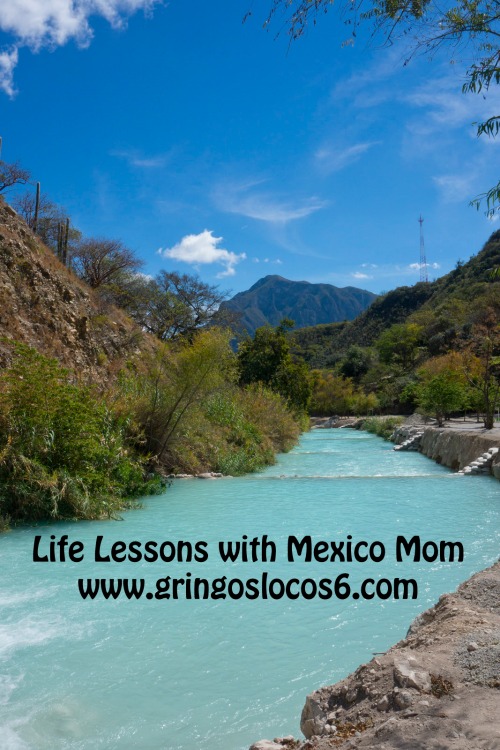
As a wife of one and a mom of four, it seems like I am always learning and discovering! I know I am not alone. Let’s just admit it: The world is a big place, life is a lesson, and children can be the best teachers. Normally my series, Life Lessons with Mexico Mom, is hosted on Los Gringos Locos, but today I am posting here on World Moms Blog.
This week’s life lessons are all about camping in the Mexico mountains. A few weeks ago we took the kids to Grutas Tolantongo. This place is amazing! It is a hot spring park located in the southeast mountains of Mexico. The hot spring water flows out of a waterfall, into a cave, down a series of rapids, and finally through the valley in a hot water river. How awesome does that sound? Here are my insights and experiences as a Mexico Mom, camping near a hot water river:
Life Lesson 56: Don’t leave the baby’s travel crib at home. Brad said we didn’t have room for it in our tent. I thought leaving it was a bad idea but I decided to go with the flow. This was a terrible mistake. Tristan was totally out of his element. He must have cried and screamed for two hours before falling asleep. We were afraid the campground was going to kick us out. Finally I put him in his stroller, which he hated even more then being free range in a small tent. When I got him out of the stroller to change his diaper, he was so exhausted from kicking and yelling that he fell asleep beside me and slept all night. From now on the crib goes with us even if Brad has to sleep outside for lack of tent space 😉
Life Lesson 57: Don’t trust a nine year old near rapids. The river is shallow and divided into pools by large stones that create small rapids. I told Taylor and Alexis to stay in a specific pool and not to go over the rapids into another pool. I was afraid they would fall on the slippy rocks. Sure enough, Taylor decides to stand up on a large stone and make funny faces while wiggling her bum at her sister. She slipped and went through the rapids. Next thing I know, her goggles are floating down the river and she is crying at the top of her lungs. After getting Taylor out of the water, I saw she had scraped her back along the rocks. She had small cuts and bruises down the length of her spine. My poor kid was a little traumatized, but after learning the hard way, she stayed away from the rapids.
Life Lesson 58: Don’t try taking the stroller on a hiking trail. Yes, we are that nutty. I guess we thought that the trail was a very short distance, with flat terrain. Nope. After walking a mile up a mountain, over steps, rocks, and tree roots, traveling through forest complete with banana trees, under a zip line, and over a few creeks, we finally made it to the other half of Grutas Tolantongo. It was worth the effort but thankfully we were able to take the shuttle back to our campsite. Oh yeah, they had a shuttle the whole time. At least we exercised for the week and saw some of the most beautiful mountain scenery in Hidalgo, Mexico.
What life lessons did you learn this past week? Please share it with us below. We want to hear your thoughts from around the world!
This is an original post to World Moms Blog by Tina Marie Ernspiker. Tina can be found blogging over at Los Gringos Locos. She is also on Facebook and Twitter.
Photo credit to the author.

by Jacqueline Jenkins (Jordan) | Jan 28, 2015 | Blogging, Cultural Differences, Culture, Expat Life, Family Travel, Husband, Interviews, Moving, Working Mother, World Interviews
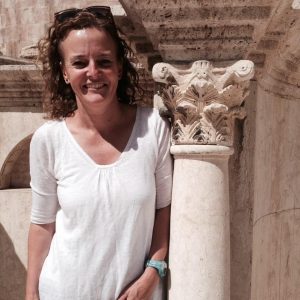 Where in the world do you live? And, are you from there?
Where in the world do you live? And, are you from there?
Four months ago, we moved to Amman, Jordan. Originally from Canada, I have been moving around the globe for more than twenty years as my husband works for UNICEF.
What language(s) do you speak?
I speak English and French. Learning Arabic is a big goal for our time here.
When did you first become a mother?
We were a carefree couple in Uganda, Lesotho, and Bangladesh. In 2000, while living in Myanmar, Meghan joined our family. In 2005, while we were posted in India, Charlie arrived. Since then, we have lived in Mozambique and New York.
Is your work stay-at-home mom, other work at home, or do you work outside the home?
I am an educator and have been incredibly fortunate to have found rewarding jobs in international schools wherever we have been posted. Most recently, I was the Elementary School Principal at the United Nations International School in Manhattan.
Since arriving in Jordan, I have been a stay-at-home Mum. I’ve been busy exploring, photographing and learning about the incredible history of the region and the issues facing not only the Jordan population, but the incredible number of Syrian refugees currently residing in the country.
My commitment to raising children who believe in peace and feel responsible for creating a better world is at the core of everything I do.
Why do you blog/write?
I write to record and process this incredible journey we are on as a family. Time passes so incredibly quickly. Without recording it, it’s hard to remember the small moments and wonderings from each posting.
How would you say that you are different from other mothers?
Being a mother in this transient lifestyle means being the key cheerleader for our family. It means setting up and taking down a house with six weeks’ notice. It means creating close friendships, and then saying goodbye. All this, while telling myself that giving my children this incredible opportunity makes the goodbyes and new hellos worthwhile.
What do you view as the challenges of raising a child in today’s world?
Raising a child in this lifestyle has incredible challenges and rewards. The challenges include culture shock every single time–even when I think the move will be easy. It means coaching myself, in my dark moments, to be present and supportive to my children. I remind myself that they have not chosen to move, but are trusting me to show them the meaningfulness of the lifestyle we have committed to as a UNICEF family.
The upsides to this lifestyle are incredible: our children interact and learn about cultures, languages, food, and religions firsthand; they are developing tolerance and empathy through relationships with many types of different people and the travel; and, before age ten, they have seen more of the world than some people manage in a lifetime!
How did you find World Moms Blog?
I learned about World Moms Blog when I was searching for women leading similar lives, facing similar issues, and who possessed the same strong desire to create a better world for our children and our children’s children. I feel blessed to be a part of this incredible community.
[Editor’s Note: A warm welcome, Jackie! We look forward to reading your posts as you settle in to your new role!]
Photo credit: Jacqueline Jenkins
This is an exclusive, World Moms Blog interview with our new writer and mother of two in Jordan, Jacqueline Jenkins. Welcome!

We are a few months into our new 'home of our heart' location in Amman, Jordan. Originally from Canada, I have been moving around the globe for more than twenty years as my husband works for UNICEF. While we were a carefree couple in Uganda, Lesotho and Bangladesh, Meghan joined our family in 2000, while we were living in Myanmar. She was joined in 2005, while we were posted in India by Charlie, her energetic younger brother! Since then we have lived in Mozambique and New York. I am an educator and have been incredibly fortunate to have found rewarding jobs in international schools wherever we have been posted. Most recently I was the Elementary School Principal at the United Nations International School in Manhattan. Since arriving in Jordan, I have been a stay at home Mum, exploring, photographing and learning about the incredible history of the region and the issues facing not only the Jordan population but the incredible number of Syrian refugees currently residing in the country. While I speak English and French, I have not yet started to learn Arabic; a big goal for our time here.
I write to record and process this incredible journey we are on as a family. Time passes so incredibly quickly and without a recording of events, it's hard to remember the small moments and wonderings from each posting. Being a mother in this transient lifestyle means being the key cheerleader for our family, it means setting up and taking down a house with six weeks notice, it means creating close friendships and then saying goodbye. All this, while telling yourself that the opportunities your children have make the goodbyes and new hellos worthwhile. Raising a child in this lifestyle has incredible challenges and rewards. The challenges include culture shock every single time, even when you feel the move will be an easy one. It means coaching yourself, in your dark moments to be present and supportive to your children, who have not chosen to move but are trusting you to show them the world and the meaningfulness of the lifestyle we have committed to as a UNICEF family. The upsides to this lifestyle are incredible; the ability to have our children interact and learn about cultures, languages, food, and religions firsthand, the development of tolerance and empathy through relationships with many types of different people and the travel, they have been to more places before the age of ten than some people do in a lifetime! My commitment to raising children who believe in peace and feel responsible for making a difference in creating a better world is at the core of everything I do.
More Posts
Follow Me:


by Dee Harlow (Laos) | Jan 14, 2015 | Africa, Domesticity, Expat Life, Family Travel, Global Citizenship, Inspirational, Lesotho, Moving, Relocating, South Africa, Uncategorized
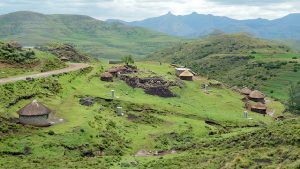 In 2002, my international investment banking career in Singapore had left me drained. I needed to find the physical and mental freedom to return to my first passion, which was development work. I left my job and embarked on a solo backpacking journey, looking for peace and inspiration. By the time I circled around sub-Saharan Africa and ended in Lesotho, I found both. I have never looked back.
In 2002, my international investment banking career in Singapore had left me drained. I needed to find the physical and mental freedom to return to my first passion, which was development work. I left my job and embarked on a solo backpacking journey, looking for peace and inspiration. By the time I circled around sub-Saharan Africa and ended in Lesotho, I found both. I have never looked back.
My very first impression of Lesotho came from the high peaks of the Drakensberg mountain range in the eastern part of the country, where the autumn air was cool and crisp. Dirt roads wound through small villages dotted with tradition rondavels made of stones or mud, with thick thatched roofs. The vast mountain plains opened up into a broad blue sky and brilliant, high-altitude sunshine. Our hiking trail climbed up rocky table mountain tops and down into freezing cold streams that cut through house-sized boulders, groves of thirsty willows, and into caves of prehistoric paintings. Lesotho, tucked completely within the walls of South Africa, seemed an ideal natural treasure to me.
Fast forward thirteen years. After living in Vientiane, Laos, for two years, last November, I arrived back in Lesotho. This time, I had a family in tow. My husband is in the U.S. Foreign Service. The rhythm of our family life consists of an international move every two to three years, with trips back to the States for home visits and language training in between.
Where I once turned to travel to help me change my life, what I now seek at each new destination is stability and conetinuity for my family.
After 22 hours of travel, we arrived in the capital city of Maseru, which is situated in the hilly western lowlands. The air is again cool and crisp, although now it is springtime. The backyard of our new house is full of bright yellow birds, endlessly flitting back and forth to complete their work. The males are busy constructing round grassy nests, which dangle festively in our trees. If a female doesn’t accept the nest, the male bird tears the entire thing apart and starts all over again. The kids and I have named one “Butternut”, and we admire his tireless work everyday.
Maseru is a small city with a growing suburban sprawl. There are barely 300,000 people in the entire urban area. The buildings are low, the traffic flows, and only a couple of noteworthy malls have popped up within the past two years. “First impressions” this time around are mainly focused on the business of getting on with life for our family–new school, new friends, new job, new supermarkets, getting the internet set up, figuring out a car, and obtaining household help. Luckily, it’s been quite easy to get everything that we need. As far as Western-style life needs go, there are plenty of products here that are brought in from South Africa and beyond.
With our basic needs met, we’ve been exploring beyond the city. I still find Mother Nature calling at every turn. Within Lesotho, you can go hiking just about anywhere. Cross a bridge and stop to hike down to explore up the river. Head up a hill to find herdsmen tending livestock. When it rains, we hike in the mud (the kids’ favorite). When it’s hot, we cool down in streams and waterfalls. The nearby children find us no matter where we go; the adults are not engaging but very courteous. Fortunately, the personal safety issues prevalent in most of South Africa are not as concerning in Lesotho yet, and most of the expats we’ve met are comfortable exploring the countryside.
After the scant two-and-a-half months that we’ve been here, we are already feeling more settled. And while we all miss what we’ve left behind in our “old” life in Laos . . . and Mexico. . . and the U.S. . . ., we begin anew to embrace what we have and to anticipate what gifts our new country holds.
Is there a change in your life that you’ve made or would like to make? What have you left or would like to leave behind, and what have you found or hope to find?
This is an original post to World Moms Blog by our mother of twins writer, Dee Harlow, currently living in Lesotho. You can also find her on her blog Wanderlustress.
Photo credit attributed to Damien du Toit. This photo has a Flickr Creative Commons Attribution-Non-Commercial-ShareAlike license.
One of Dee’s earliest memories was flying on a trans-Pacific flight from her birthplace in Bangkok, Thailand, to the United States when she was six years old. Ever since then, it has always felt natural for her to criss-cross the globe. So after growing up in the northeast of the US, her life, her work and her curiosity have taken her to over 32 countries. And it was in the 30th country while serving in the Peace Corps in Uzbekistan that she met her husband. Together they embarked on a career in international humanitarian aid working in refugee camps in Darfur, Sudan, and the tsunami torn coast of Aceh, Indonesia.
Dee is now a full-time mother of three-year old twins and continues to criss-cross the globe every two years with her husband who is in the US Foreign Service. They currently live in Vientiane, Laos, and are loving it! You can read about their adventures at Wanderlustress.
More Posts

by Melanie Oda (Japan) | Jan 8, 2015 | 2014, Awareness, Child Care, Childhood, Culture, Domesticity, Education, Expat Life, Eye on Culture, Family, Feminism, Grandparent, Home, Husband, International, Japan, Life, Life Lesson, Living Abroad, Marriage, Me-Time, Motherhood, Multicultural, Parent Care, Parenting, Priorities, Relationships, Responsibility, School, Social Equality, Womanhood, Women's Rights, World Motherhood, Younger Children
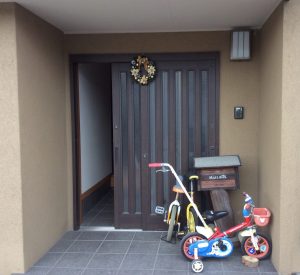 Gender equality has been in the news quite a bit in Japan recently, sort of, and some things have happened closer to home that have me thinking.
Gender equality has been in the news quite a bit in Japan recently, sort of, and some things have happened closer to home that have me thinking.
It started when a (female) Tokyo assembly member was heckled in a sexist way. Then Prime Minister Abe introduced some new policies to let women “shine.” (He needs to get them doing something for the economy.) He even appointed several women to cabinet posts, for about five minutes, until they were slapped back down into their places over minor scandals.
In Japan, people are talking more about issues women face but no one seems to be doing much about them.
(Lest I forget: strangely enough, the declining birth rate is treated as a “women’s issue.” I seem to remember my husband being involved, too.)
I never considered myself a feminist growing up. Some members of the evangelical, conservative community I grew up in doubtless felt “feminist” was a new version of the “F-word.”
OK, so I went to a high school with more sports options for boys than girls. And yes, girls were encouraged to take chorus and home economics instead of woodworking or mechanics. So maybe I heard men from my community refer to grown women as “broads” or “gals.” There also were some restrictions at church regarding women’s and men’s roles. But I never felt that possessing certain types of baby-making parts limited my potential.
Then I moved to Japan, where gender roles are more firmly entrenched and my way of thinking slowly changed.
As I get older, and because I am a mother, I find that I am limited in ways that I couldn’t have foreseen as a young girl.
Some people may find life here in Japan freeing. If you aspire to be a homemaker a la Martha Stewart, then your life’s work would be very much respected and appreciated here. My husband wouldn’t bat an eyelid if he came home to a messy house because I’d spent the day at a preschool mothers’ lunch. He knows that is part of the job (on the other hand, it would never occur to him to pick up the mess himself.)
If, as a woman, you have other aspirations, Japanese culture seems designed to work against you. The glass ceiling is very much in tact. On the news here you do hear issues like lack of childcare and “maternity harassment” being addressed. But what gets talked about less often is that to many women, including myself, it feels as if there’s a glass door as well.
It’s my front door.
Before a woman can even think about what is facing her out in the world, she needs to address the forces that are keeping her at home. Some of these are practical, some are logistical, some are cultural and perhaps peculiar to Japan and it’s work culture.
For me, it starts with my husband: He leaves home at 7am every morning, but I have no idea what time he will be back. Sometimes it’s 7pm. Sometimes it’s midnight. He may be in the office that day, or he may suddenly be sent to another prefecture. He’s made international trips on 12 hours notice. I cannot depend on him being home at a designated time, by no fault of his own. The idea of him taking time off with a sick child is preposterous in the extreme.
I have been lucky enough to have two job offers recently, both of which would be more or less during school hours, but neither is nearby. If a child were to get sick and need picking up, or if god-forbid there was a natural disaster (which is always in the back of your mind if you are a mother in Japan,) then my husband would be closer. I mentioned that, and he completely shot me down. Not just the idea of him picking up the kids in case of an emergency, but the idea of a job anywhere outside of cycling distance from the school.
We live in a residential neighborhood. I patch together some part-time work here and there, but it’s not like there are loads of professional opportunities in a two kilometer radius.
I suddenly felt very limited, penned in, in a way I haven’t felt before. The glass door was slamming in my face.
I don’t think I’m alone in this conundrum. Go to almost any supermarket in a residential area during the day, and you will see women in their prime working years manning the register. Many of these women have university degrees. Many have licenses and qualifications to be doing other kinds of work, but they want to stay close to home. They also need salaries to stay under $10,000 year or face a peculiar Japanese tax code and insurance system that penalizes families where both partners have incomes over that amount.
Then there are my kids: Like 2/3 of Japanese women with children under 6, I stayed home when they were small. They now completely depend on me for everything. It seems to have never entered their minds that someone else could give them a bath or help them find their missing socks, mostly because no one else has ever done anything for them. Especially when they are sick, they want only me. It was very hard when my daughter was in the hospital, both children wanting to be with me and emphatic that no one else would do.
But now my youngest is in elementary school, and I would like to just be doing more of something….else, but for me to plunge into the workforce would be a huge adjustment for my children. Is it worth the stress? Can we survive what is sure to be a painful adjustment period?
Maybe if I had more family support, it would feel less impossible but as it is, it seems like everyone is against me.
Which brings me to the final characters in this comedy, my in-laws: They say they’ll watch the kids, then they change their minds. Or something better comes up. From their point of view, this house and these people are completely my responsibility. Anything they do is extra credit.
To be honest, we’re getting to the point where my in-laws need my help more than I need theirs.
They aren’t shy about letting me know my place.
One day not too long ago, my son was playing at the park with his friends. It was getting close to homework time, so I called him and told him to come home. He said he was playing with Jiji (which is an endearing term for grandfather used in our region of Japan,) and could he play for a bit longer? Since he was out with an adult, I said okay.
The next day, I got a verbal whipping from my father-in-law over the phone, accusing me of being irresponsible, a bad mother. It took me a few minutes to understand why he was saying this, but when I got to the bottom of it, I realized my son had lied to me. He was playing with his friends when Jiji walked by and told him to go home. My son told him I wasn’t at home and said he couldn’t come back until I did. (I must have called right at this point.) “How dare you not be home in the afternoon?” said Jiji.
Putting aside that none of this nonsense was true, so what if I wasn’t home in the afternoon? Of course I wouldn’t have left the kids to wander the neighborhood like stray dogs, but why was my not physically being inside my house such an issue to him? His assumption that it was my duty to be always available to everyone took me by surprise.
I could almost hear the glass door slamming again.
There are also other barriers for women in Japan—an over active PTA for one, and a myriad of community responsibilities attended to exclusively by women for another. I imagine most women in the world encounter both the “glass door” and the “glass ceiling” in some form or another, but in Japan only one of these factors is seems to be getting much attention. Building new daycare facilities isn’t enough; the government stating goals to increase women’s participation in the workforce isn’t enough. Until we do something about that glass door, nothing will change for one of the best educated, least utilized group of women in the world.
Do you feel you are fulfilling your potential, both at work and at home? What’s the situation like in your country?
This is an original post for World Moms Blog from our writer and mother of two in Japan, Melanie Oda.
If you ask Melanie Oda where she is from, she will answer "Georgia." (Unless you ask her in Japanese. Then she will say "America.") It sounds nice, and it's a one-word answer, which is what most people expect. The truth is more complex. She moved around several small towns in the south growing up. Such is life when your father is a Southern Baptist preacher of the hellfire and brimstone variety.
She came to Japan in 2000 as an assistant language teacher, and has never managed to leave. She currently resides in Yokohama, on the outskirts of Tokyo (but please don't tell anyone she described it that way! Citizens of Yokohama have a lot of pride). No one is more surprised to find her here, married to a Japanese man and with two bilingual children (aged four and seven), than herself. And possibly her mother.
You can read more about her misadventures in Asia on her blog, HamakkoMommy.
More Posts

























